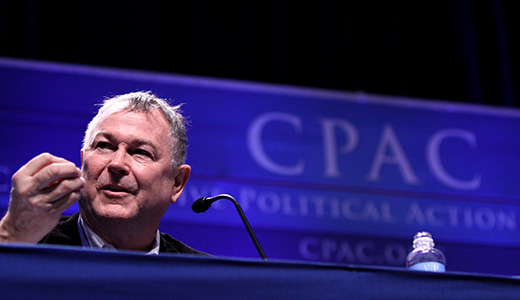
On a trip to Baghdad last week, Congressman Dana Rohrabacher, R-Calif., enraged Iraqi officials by saying that Iraq should repay the U.S. for the cost of the war and occupation launched by President George W. Bush in 2003.
“Once Iraq becomes a very rich and prosperous country … we would hope that some consideration be given to repaying the United States some of the mega-dollars that we have spent here in the last eight years,” Rohrabacher told journalists at the U.S. embassy in Baghdad on Friday, Agence France Press reported.
“We were hoping that there would be a consideration of a payback because the United States right now is in close to a very serious economic crisis and we could certainly use some people to care about our situation as we have cared about theirs,” Rohrabacher said.
He may have been channeling billionaire Donald Trump, who back in April said the U.S. should stay in Iraq and “keep the oil … take what’s necessary for us and we pay our self back $1.5 trillion or more.”
The National Priorities Project estimates the U.S. cost of the Iraq war at over $783 billion. Others, including economist Joseph Stiglitz and public policy expert Linda Bilmes, put the real cost at $3 trillion and more.
Estimates of the Iraqi cost of the war could not be found on the web. Iraq Body Count has documented more than 100,000 Iraqi civilian deaths because of the war. The cost to Iraq of rebuilding the massive social and infrastructure wreckage is certain to be enormous.
Perhaps Rohrabacher should look closer to home for help with replenishing the U.S. pocketbook.
It seems that top U.S. military contractors made out like bandits during the Iraq war.
In 2005, two years into the war, CorpWatch reported that top defense contractors “Lockheed Martin, Boeing, Northrop Grumman, Raytheon, General Dynamics, Honeywell and United Technologies have all done well in the first half of this year and have a huge backlog of orders.” In subsequent years, their profits kept on climbing. A 2008 Reuters report showed rising profits for Northrop Grumman, General Dynamics and Boeing’s military division. And so it went.
Boeing has been among Rohrabacher’s top 20 contributors (just above the National Rifle Association) since he was first elected to Congress in 1988. Boeing was number 2 in a 2006 list of the top 100 Defense Department contractors.
Honeywell was Rohrabacher’s top campaign contributor during the 2009-2010 election cycle, according to OpenSecrets.org. Honeywell was number 22 on that top-100 military contractor list.
Other U.S. war profiteers include Halliburton spinoff KBR, which in 2007 reported “a surge in profits boosted by its war-related business,” according to the UK Times. The next year, its profits nearly tripled, and despite numerous charges of fraud and incompetence in its work in Iraq, it received a new $150 billion 10-year Pentagon contract.
Perhaps these corporations and their CEOs should be asked to reimburse the U.S. and Iraq for the crushing costs of the war.
Photo: Rep. Dana Rohrabacher, R-Calif., speaks at the 2011 Conservative Political Action Conference in Washington, Feb. 12. Gage Skidmore CC 2.0

MOST POPULAR TODAY


Zionist organizations leading campaign to stop ceasefire resolutions in D.C. area

Communist Karol Cariola elected president of Chile’s legislature

Afghanistan’s socialist years: The promising future killed off by U.S. imperialism

High Court essentially bans demonstrations, freedom of assembly in Deep South






Comments